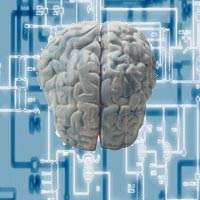This post, is in response to a lot of the previous posts here, and not just specifically about death.
My own opinion about god... in our universe, something does not come from nothing. Every effect must have a cause(and thus we can use logic)
Yet the cause, and the cause before that, and the cause before that, up until the Big bang... and before that... there is no cause. There should be no original cause for the universe to exist, and yet it does.
It's interesting really to note that logic, cause and effect are not the true nature of things, as our existence proves.
SO what was the first cause, the cause without a cause of it's own? Something very unusual one must assume. That first cause, that can maintain itself, that exists without the support of anything else, is called god... Just a name really. It's not like we can understand a being that is basically outside of logical modelling.
The Christian, Muslim, Jewish gods, all seem to me to be very human. The only religeons i know of where god isn't human, would be Buddhism, where there really is no god, though you seek to attain the state of undefined-ness.. beyond logic.
Which is essentially similar to the concept in yoga... where you also have Ishvara. The Unaffected One, the unchanging one... the being outside of time and cause and effect.
If i had to place a bet, i'd say that the original cause is something like this Ishvara construct.
---
Then there's human consciousness. As a Comp Sci person, my opinion is that no AI you could ever develop would have a consciousness of it's own. It may seem to behave intelligently and you may assume that it's alive, but that's just a mistake of making a judgement based on generalizations. In the end, inside of the computer, it'll still be one instruction being processed at a time(more or less).
... So it should be with humans. The chemicals moving around and interacting should not create a consciousness, they should just keep on working, and we should be a form of organic machinery.
... I have actually met some people who could not understand the concept of being able to know with surety that you are alive. That you don't need proof for it.
(very worrying, makes me wonder if they're soul-less

)
Most science is a matter of making models and testing them against the environment to see how well they match. Nothing says that knowing 10 qualities of an object is enough to even make a good model of the object you're studying, except in a certain context... The model however is not the original object(despite our often acting as if it is so). Neverthless there are truths of sorts. Truths that need no proof, truths that exist... Like your knowing that you are alive.
Sadly, you can't prove that anyone else is alive, since you have no way of knowing that they have a true inner consciousness.
So this is merely an assumption.. that other people are alive. An assumption that we all make, and for which we have no proof at all... beyond having generalized our own individual self-experience, to all beings that seem physically similar to us.
Any decently logical person should consider these things. Yet we find no serious supporters/believers of such thought, unlike atheists.
IMO, atheists are more likely to be people who fear the concept of god, and would prefer not to believe it. And they turn that preference into a belief in itself(Some are quite violent about it

.. not at all the logical people they try to portray themselves as)
-------
As for death, i believe that we are a part of the human race. A super-organism of sorts. Our desires(like sex) have no inherent meaning or worth beyond the survival of the species. Our logic is overriden by the desires that maintain our species(some people actually rebel against this

).
But really, that's what we are. We are not independent beings. We are parts of a whole.
What seperates supposedly good people from evil ones? The amount of importance they give to their own individual pleasures... Evil people being a defective type of humanity. Probably akin to diseases with respect to our body.
What does not help the organism as a whole, is obviously a problem(like cancer).
Anyway, regarding death, or at least aging. I think that our species' ability to adapt, is largely linked to it. A static type of humanity would be killed off quickly by more advanced diseases.
But also, our mental evolution, as a people would be impaired by too many primitive minded(by that time) people, still able to have a voice and try to enforce their views. Even scientists cannot easily give up their scientific faiths. Maxwell i recall couldn't fully believe in his own theories, because they contradicted what he was taught.... Who knows how far he could have gotten, even if he had lived a long time. The human brain is after all, more experience based than logic based.
Besides... what will you even do with immortality. We live for pleasure(let's ignore pain here). How long before nothing gives you any lasting pleasure or satisfaction?
.. and what are you really seeking, bodily thrills that have no meaning beyond what was accidentally left in us by our evolution?
Roller coasters for example, are fun. But should they really be fun? Does music really have any meaning. Our brains decide to derive pleasure from such things. Probably just a glitch in the system that's supposed to help us survive... That's what happens when you make a system incrementally, eventually an overly simplistic original design simply can't handle the greater requirements, and there's almost no way to properly add them while following the original paradigm... What is really needed is a redesign on the basis of a superior paradigm(but then, the new being wouldn't be human

)
---
As for intelligence being the ability to give up all dogma. Not really. To have no beliefs, no existing models of reality to work with, would mean that you'd be analyzing everything from scratch, and just being able to take a step correctly(with correctly being redefined) might take days of reprocessing... assuming that the brain could actually manage that

Intelligence, is the ability to create models of the universe around you that match well with it, with respect to the paramaters you can use for testing. The models are inevitably lacking.
Great intelligence normally is the ability to either analyze and model quickly(as in the mensa test), or make large detailed models, when existing models are reanalyzed and found to be faulty or incomplete.
The reanalysis can't be done all the time though, so most of the time you're just using models for processing, no matter how unbiased you wish to be.
What is religous faith, but the use of a model, for navigating your life? Jesus may well have been able to raise the dead. It doesn't match any of our current models of humanity and what humanity can achieve(temporarily assuming he was human

), but you can't state that he definitely couldn't do it.
And if you assume that the history that came down to us is the truth as the people writing knew it(an assumption we make about most things), then perhaps he could.
---
As for Santa. It's more correct to say that we believe the likelihood of the existence of such a character is negligible. Practically nothing has a probability of 0.0. Since it seems extremely improbable, i choose not to believe that he exists.
(or the world could be filled with bad kids

)
But still Santa doesn't seem like a good generalization for god. God constitutes a reasonable possibility for the kind of being that could be the original cause for the existence of our universe, since i seriously doubt that matter can create and then maintain itself(as in it's shape, since that too is a product of physics.. laws that seem to have come into existence for no good reason)
Edited by karsus, 14 May 2006 - 12:09 PM.





















































